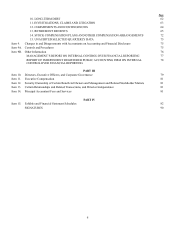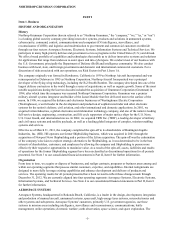Northrop Grumman 2012 Annual Report Download - page 19
Download and view the complete annual report
Please find page 19 of the 2012 Northrop Grumman annual report below. You can navigate through the pages in the report by either clicking on the pages listed below, or by using the keyword search tool below to find specific information within the annual report.
NORTHROP GRUMMAN CORPORATION
-9-
investors, and communities that rely on the companies in the defense industrial base. There are many variables in
how the law could be implemented that make it difficult to determine specific impacts; however, we expect that
sequestration, as currently provided for under the Budget Control Act, would result in lower revenues, profits and
cash flows for our company. Such circumstances may also result in an impairment of our goodwill.
As a U.S. Government contractor, we are subject to various procurement regulations and could be adversely
affected by changes in regulations or any negative findings from a U.S. Government audit or investigation.
U.S. Government contractors must comply with many significant procurement regulations and other requirements.
These regulations and requirements, although customary in government contracts, increase our performance and
compliance costs. New regulations or procurement requirements (including, for example, counterfeit parts and
conflict minerals) or changes to current ones, could increase our costs and risks and reduce our margins. Failure to
comply with these regulations could, among other things, result in the withholding of payments and adversely
impact our reputation and ability to participate in future U.S. Government contracts.
We operate in a highly regulated environment and are routinely audited and reviewed by the U.S. Government and
its agencies, such as the Defense Contract Audit Agency (DCAA), Defense Contract Management Agency (DCMA)
and DoD Inspector General. These agencies review performance under our contracts, our cost structure and our
compliance with applicable laws, regulations and standards, as well as the adequacy of, and our compliance with,
our internal control systems and policies. Costs ultimately found to be unallowable or improperly allocated to a
specific contract will not be reimbursed or must be refunded if already reimbursed. If an audit uncovers improper or
illegal activities, we may be subject to civil and criminal penalties, sanctions or suspension or debarment from doing
business with the U.S. Government. Whether or not illegal activities are alleged, the U.S. Government also has the
ability to decrease or withhold certain payments when it deems systems subject to its review to be inadequate. In
addition, we could suffer serious reputational harm if allegations of impropriety were made against us. If such
actions were to result in suspension or debarment, this could have a material adverse effect on our business.
We are from time to time subject to U.S. Government investigations relating to our operations, and we are subject to
or expected to perform in compliance with a vast array of federal laws, including but not limited to the Truth in
Negotiations Act, the False Claims Act, the Procurement Integrity Act, Cost Accounting Standards (CAS), Federal
Acquisition Regulation (FAR), the International Traffic in Arms Regulations promulgated under the Arms Export
Control Act, the Close the Contractor Fraud Loophole Act and the Foreign Corrupt Practices Act. If we are found to
have violated the law, or are found not to have acted responsibly as defined by the law, we may be subject to
reductions of the value of contracts, contract modifications or termination and the assessment of penalties, fines, or
compensatory or treble damages, which could have a material adverse effect on our financial position, results of
operations, or cash flows. Such matters could also result in suspension or debarment. Given our dependence on
government contracting and authorizations, suspension or debarment could have a material adverse effect on our
financial position, results of operations or cash flows.
Changes to business practices for U.S. Government contractors could have a significant adverse effect on current
programs, potential new awards and the processes by which procurements are awarded and managed.
Our industry has experienced, and we expect it will continue to experience, significant changes to business practices
as a result of an increased focus on affordability, efficiencies, and recovery of costs, among other items, and a
reprioritization of available defense funds to key areas for future defense spending. For example, the DoD’s Better
Buying Power Initiative continues to evolve in its efforts to reduce costs, gain efficiencies, refocus priorities and
enhance business practices used by the DoD, including those used to procure goods, services and solutions from
defense contractors. In addition, the DCMA has implemented cost recovery initiatives designed to prioritize efforts
to recover costs and close open audits. As a result of certain of these initiatives, we have experienced and may
continue to experience an increased number of audits and/or a lengthened period of time required to close open
audits. More recently, the thresholds for certain allowable costs are being challenged and refined.
These efforts have had, and we expect them to continue to have, a significant impact on the contracting environment
in which we do business. In support of the implementation of the Better Buying Power Initiative, the U.S.
Government is issuing new regulations and requirements that are shifting additional responsibility and performance
risks to the contractor. While the impact to our business as a result of these changes remains uncertain, our business
and industry could be materially adversely affected.
























